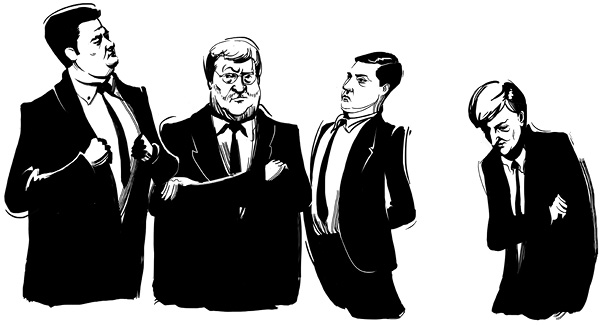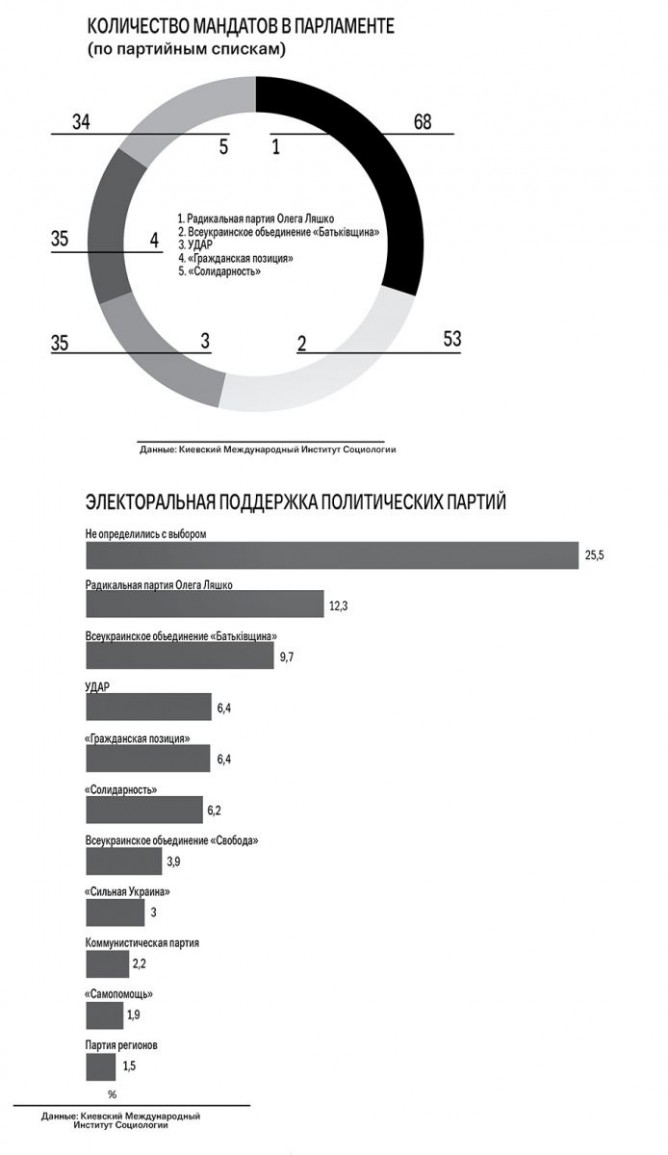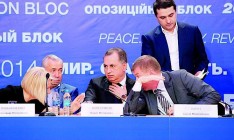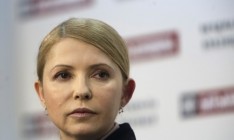Politics
maneuversEarly elections will reform half of the Verkhovna Rada, though will not reduce the influence of the oligarchs on politics

Ukrainians that recently cast their votes in the presidential election will have to vote again. In August the president may have valid grounds for dissolution of the Verkhovna Rada and set the date for the election of a new parliament. While officials in the VR are debating on the system to be used for the election of the parliament of the VIII convocation, sociologists are already predicting its future composition.
For example, last week the Kyiv International Sociology Center conducted a survey of electoral preferences of Ukrainians. Based on its results, 56% of Ukrainian citizens are ready to take part in the elections. Their votes will allow seven parties to win seats in the new parliament. Three of those parties are not presented in the parliament with their own factions. Thus, the current leader of electoral sympathies is Oleh Lyashko’s Radical Party (22.2%), Batkivshchyna would gain 17.4%, UDAR and Anatoliy Hrytsenko’s Civil Position – 11.5% each and the president’s party Solidarity – 11.1%. The Svoboda party and the Strong Ukraine party led by Serhiy Tihipko also have a chance of winning seats in the parliament of the new convocation with 6.9% and 5.3%, respectively.
Approximately the same results were recently published by other sociological companies. In their surveys some Ukrainian parties changed places in the ranking, but the overall trend remained the same. For now neither the Svoboda, nor the Strong Ukraine parties have a guarantee of winning seats in the new parliament. Meanwhile, the Party of Regions and the Communist Party of Ukraine still have not lost a chance of winning seats in the election, though it is slim to none.
Ukrainians need ideology, not emotions
Of course, the results of the current opinion polls do not give an accurate picture of the composite of the new parliament, but they have already outlined the principles that will guide Ukrainians in voting. The polls show that voters tend to vote not for ideology, rather for parties led by memorable leaders, hence the high ratings of the Solidarity and the Strong Ukraine parties, which are currently in the stage of formation.
“Nobody pays attention to ideology anymore. People look up to leaders and their deeds. The Solidarity party relies on the rating of the president, who has the most positive balance of trust and distrust. Everybody looks at the president's actions and conveys their attitudes towards his party that very few people are aware of, whether they like it or not. The same goes for the Batkivshchyna party, which can barely hurdle the 5% threshold without Tymoshenko,” says political analyst Viktor Ukolov.
MP Volodymyr Kurinniy (UDAR) believes that ideological orientation has led to a significant loss of support among voters in favor of the Svoboda party. Many of its former supporters now prefer Lyashko. “Ideology is the minus of Svoboda as it strongly narrows its base. Lyashko, without any ideology, gains more support of the voters with his speeches, which is reminiscent of Tymoshenko during her campaign in 2007. He is a kind of antenna that captures the mood of the people,” said Kurinniy.
Director of the Ilko Kucheriv Democratic Initiatives Foundation Iryna Bekeshkina predicts that if early elections are held this fall the composite of the parliament may be renewed by half. “The Verkhovna Rada will change dramatically. But it is unclear whom Lyashko’s Radical Party, known only by its leader, will bring to the parliament. It is unclear what kind of people will run for seats in the parliament with the Solidarity party, which was only recently formed. We can expect that there will be some new people on the lists of the Batkivshchyna and UDAR parties. I expect that at least half of the parliament will be renewed,” said Bekeshkina.
She added that during the last few weeks, politicians have an opportunity to attract new supporters to their side. Moreover, one fourth of the voters are still undecided. This will mainly depend on the development of the situation in the Donbas and the stance of parties on the issue of war and peace. “People want peace, not war. They are tired of hostilities and terrible news from the east,” says Ukolov.
Social psychologist Oleh Pokalchuk believes that military operations in the Donbas will be used to manipulate the minds of voters. He adds that many parliamentary forces have already chosen their strategy of making statements in the mass media. “Critics of the current government, i.e. the former members of the PoR, will demand peace at any price. Others will insist on radicalization and demand the introduction of martial law,” said Pokalchuk.
Lyovochkin and Kolomoysky divide MPs
Head of the Committee of Voters of Ukraine Oleksandr Chernenko says another factor that may have a significant impact on the composite of the new parliament is preservation of the existing proportional-majoritarian voting system. This means that half of the MPs will be elected in districts. “I believe MPs who are already working with districts think have good chances of being re-elected. Most of them will try to cooperate with the victorious parties in the elections at a later date,” he said in a conversation with Capital.
Vice President of the Association of People’s Deputies Oleksandr Barabash believes that the majoritarian system is profitable for financial and industrial groups currently fighting for the influence of the new composite of the parliament.
Political analyst Andriy Zolotaryov notes that major business has already completed regrouping of its spheres of influence – Dmytro Firtash and Rinat Akhmetov have temporarily lost their positions and the first place now belongs to Ihor Kolomoyskiy and the group of business owners close to the president. “Some financial groups have less influence now, but during the election they will wager on new political projects,” says Barabash.
Kurinniy says he heard that people close to Kolomoyskiy mentioned the creation of his own political project to run in the elections. “This is a third party in the campaign after Lyashko and the Svoboda party, which will use radical and military rhetoric. This party will talk about its success. The truth is it was successful only in the formation of battalions,” says Kurinniy.
Capital’s source in the Economic Development parliamentary group, which also announced its withdrawal from the coalition, said its members are holding talks about their participation in Tihipko’s project Strong Ukraine. According to him, this project may also be supported by the head of the Dnipropetrovsk Oblast State Administration. “Kolomoyskiy will finance several forces, including Batkivshchyna,” said political analyst Taras Berezovets.
Kolomoyskiy’s competitors for influence on internal Ukrainian processes are the former head of the Presidential Administration Serhiy Lyovochkin and businessman Dmytro Firtash, who also hope to introduce new projects in the VR. Lyovochkin publicly supports the Party of Development of Ukraine, the structure of which is actively made up of former members of the PoR. Today, the conditional “Lyovochkin group” in the parliament consists of approximately 20 MPs, but may grow significantly after the election. The Party of Development, whose ratings are still close to statistical error, will not contribute much to this process. The stake will be made on other political projects. “First of all, it is Oleh Lyashko. Just look what sort of awareness campaign was launched against him by media controlled by Lyovochkin’s rival Kolomoyskiy. Lyashko himself is engaged in liberation of the Donbas live on the Inter TV channel,” said Capital’s source in Batkivshchyna.
At the same time, the source in Lyashko’s headquarters assures that at present speaking of a single source of financing for campaigns would be wrong. “Even before the presidential election, when polls showed the increase in the rating of Lyashko and people wanting to participate in the campaign for elections to the city council and the parliament lined up at his office,” he said.
Berezovets also supports this version. He notes that many people would like to support Lyashko’s campaign, but he has no contract with a major investor yet. The Svoboda party also has no main sponsor, but until recently, according to the interlocutor, it has been financed by Kolomoyskiy and the Klyuyev brothers.
Berezovets says that at the moment Firtash and Lyovochkin are funding the Development of Ukraine and UDAR parties. In addition, Lyovohckin is interested in Hrytsenko’s Civil Position party. The same information was confirmed by Capital’s source on the market of PR technologies. It says spin doctors usually associated with Lyovochkin were seen in Hrytsenko’s campaign headquarters during the presidential election. Capital did not manage to confirm this information officially. An interlocutor from Hrytsenko’s inner circle said that financial assistance was provided to the former Minister of Defense by his fellow party members, though no names were disclosed.
Berezovets also believes that Firtash and Lyovochkin are now struggling with the entourage of ex-president Viktor Yanukovych for the creation of new political projects with a leftist ideology.
Capital’s sources in the Batkivshchyna faction assure that VR Speaker Oleksandr Turchynov and Premier Arseniy Yatsenyuk are considering running in the elections under the banner of their own political projects.
How parties are funded
Financing of political parties is one of the main secrets of Ukrainian politicians, which is cautiously guarded. All questions about the sources of funding for political activities of parties are answered by mentioning the membership fees and donations from like-minded persons.
President of the Ukrainian branch office of the international organization Transparency International Oleksiy Khmara said in a conversation with Capital that today there are several forms of resource support of political parties. Donations from their active members belong to the first type. The second form of support is providing party structures with material resources for free use. This may be the property of party offices, transportation services and media grounds for party leaders.
The third form of financing is large financial donors who provide most of the funds. Usually, money forms the party reserve and is registered to various funds and shell structures to ensure its turnover. Large amounts are not kept in party registers – they are used in various projects. Another form of financing is lobbying, which is mostly practiced by agricultural, raw materials and energy businesses.
Capital’s source in the central headquarters of Batkivshchyna points to Mykola Martynenko, Chair of the VR Committee for Energy Industry Affairs, as an example of a lobbyist in the party. Martynenko is credited with the main funding for the Front for Change party and after the merger with Batkivshchyna for support of Tymoshenko’s political activities. “Martynenko and some others are not sponsors, but rather fundraisers. They raise funds for political projects quite successfully. I do not think they spent their own money,” said Kurinniy.
Legal Adviser at the International Foundation for Electoral Systems (IFES) Denys Kovryzhenko told Capital that the only attempt to “whitewash” the party’s funds was made by Our Ukraine, the party of ex-president Viktor Yushchenko. Then the central office of the party tried to legalize incoming sponsorship funds and paid salaries to its staff. But it ended up in bankruptcy of regional organizations and lawsuits from employees who have not been paid their wages.
Kovryzhenko estimated that the annual budget of one party starts with hundreds of thousands of dollars and reaches tens of millions depending on the size of a political force and its activity.
One of the spin doctors, on condition of anonymity, said in a conversation with Capital that as of the end of 2013 major businesses funded only parliamentary majority parties, first of all – the Party of Regions. The source added that there was a tacit agreement with regional business that support social initiatives, projects for regional development, provision of the party structure and paying salaries of its functionaries. For example, Chairman of the Board of the Group DF Dmytro Firtash funded the implementation of PoR projects in a number of Ukrainian oblasts. Today the party is supported by Akhmetov and his business partner Vadym Novinskiy.
“At that time, the PoR was the largest party in Europe in terms of the number of its members after the United Russia. The costs of its regional operation were paid by businesses, which in exchange would get the opportunity to work freely,” says the political strategist.
The interlocutor says the major business has never financed one political force. For example, Rinat Akhmetov, being the main sponsor of the PoR, funded Oleh Lyashko and Natalya Korolevska. The All-Ukrainian Union Svoboda started its political activities with the support of MP Ihor Kryvetskiy, but later was forced to seek funding from a larger business.
With the change of government business always plays it safe to protect itself from possible losses of property. A political consultant who has worked in Poroshenko’s campaign headquarters said in a conversation with Capital that the campaign of the future president was almost free of charge for him. Major entrepreneurs whose businesses have been associated with PoR have fully paid for advertising, organization and operation of local staffs and electioneers in the regions. He added that a similar trend could be observed in the upcoming parliamentary elections. “During these elections the main focus will be made on building the infrastructure in the Donbas region. There is already a number of people willing to lobby big government contracts in the Presidential Administration,” said the source. At the same time, Capital’s source in the Solidarity party says today the main funds supporting the activities of the political force are provided by businesses associated with the president.








 of the agreement of syndication with Financial Times Limited are strictly prohibited. Use of materials which refers to France-Presse, Reuters, Interfax-Ukraine, Ukrainian News, UNIAN agencies is strictly prohibited. Materials marked
of the agreement of syndication with Financial Times Limited are strictly prohibited. Use of materials which refers to France-Presse, Reuters, Interfax-Ukraine, Ukrainian News, UNIAN agencies is strictly prohibited. Materials marked  are published as advertisements.
are published as advertisements.